

Alpheus (mythology) Amphitrite. Mythography[edit] Amphitrite is not fully personified in the Homeric epics: "out on the open sea, in Amphitrite's breakers" (Odyssey iii.101), "moaning Amphitrite" nourishes fishes "in numbers past all counting" (Odyssey xii.119).
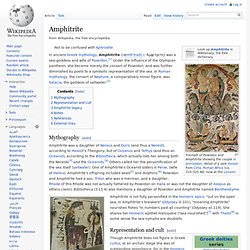
She shares her Homeric epithet Halosydne ("sea-nourished")[7] with Thetis[8] in some sense the sea-nymphs are doublets. Representation and cult[edit] Anapos. Brizo. Ceto. For the minor planet, see 65489 Ceto.
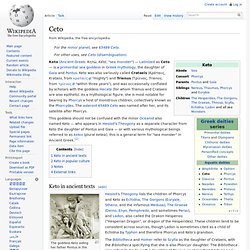
Keto in ancient texts[edit] The Scholiast on Apollonius Rhodius cites Phorcys and Ceto as the parents of the Hesperides, but this assertion is not repeated in other ancient sources. Charybdis. Charybdis or Kharybdis (/kəˈrɪbdɨs/; Greek: Χάρυβδις, pronounced [kʰárybdis]) was a sea monster, later rationalised as a whirlpool and considered a shipping hazard in the Strait of Messina.
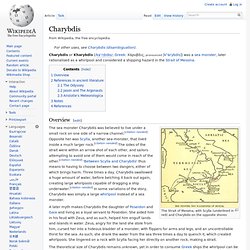
Overview[edit] The Strait of Messina, with Scylla (underlined in red) and Charybdis on the opposite shores The sea monster Charybdis was believed to live under a small rock on one side of a narrow channel. [citation needed] Opposite her was Scylla, another sea-monster, that lived inside a much larger rock. Coventina. Inscribed bas-relief of Coventina Coventina was a Romano-British goddess of wells and springs.
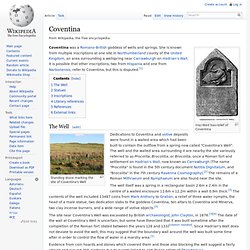
She is known from multiple inscriptions at one site in Northumberland county of the United Kingdom, an area surrounding a wellspring near Carrawburgh on Hadrian's Wall. It is possible that other inscriptions, two from Hispania and one from Narbonensis, refer to Coventina, but this is disputed.[1] Cymopoleia. In Greek mythology, Cymopolea or Kymopoleia (Κυμοπόλεια) was a daughter of Poseidon.
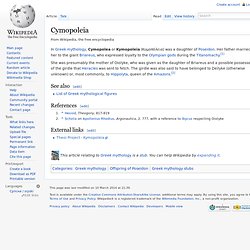
Her father married her to the giant Briareus, who expressed loyalty to the Olympian gods during the Titanomachy.[1] She was presumably the mother of Oiolyke, who was given as the daughter of Briareus and a possible possessor of the girdle that Heracles was sent to fetch. The girdle was also said to have belonged to Deilyke (otherwise unknown) or, most commonly, to Hippolyta, queen of the Amazons.[2] See also[edit] List of Greek mythological figures References[edit] External links[edit] Theoi Project - Kymopoleia. Doris (mythology) Doris is a semi-common female name.
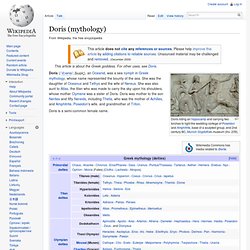
Euryale. Euryale (/jʊˈraɪəliː/; Greek: Εὐρυάλη, English translation: "far-roaming"[citation needed]), in Greek mythology, was the second eldest one of the Gorgons, three vicious sisters with brass hands, sharp fangs, and hair of living, venomous snakes.
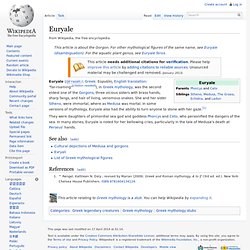
She and her sister Stheno, were immortal, where as Medusa was mortal. In some versions of mythology, Euryale also had the ability to turn anyone to stone with her gaze.[1] They were daughters of primordial sea god and goddess Phorcys and Ceto, who personified the dangers of the sea. Eurybia (mythology) Thespius's daughter is also named Eurybia.
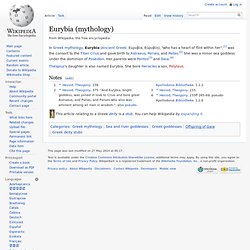
She bore Heracles a son, Polylaus. Fontus. Votive altar dedicated to the Divine Fontes (plural) In ancient Roman religion, Fontus or Fons (plural Fontes, "Font" or "Source") was a god of wells and springs.
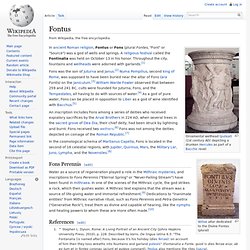
A religious festival called the Fontinalia was held on October 13 in his honor. Throughout the city, fountains and wellheads were adorned with garlands.[1] An inscription includes Fons among a series of deities who received expiatory sacrifices by the Arval Brothers in 224 AD, when several trees in the sacred grove of Dea Dia, their chief deity, had been struck by lightning and burnt.
Fons received two wethers.[6] Fons was not among the deities depicted on coinage of the Roman Republic.[7] Glaucus. Glaucus and Scylla Glaucus (Γλαῦκος, gen: Γλαύκου) was a Greek prophetic sea-god, born mortal and turned immortal upon eating a magical herb.
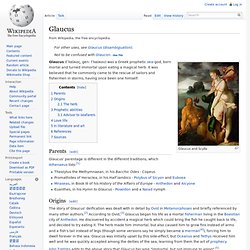
It was believed that he commonly came to the rescue of sailors and fishermen in storms, having once been one himself. Graeae. In Greek mythology the Graeae (Gry-eye, gry-ee, gray-ee; English translation: "old women", "grey ones", or "grey witches"; alternatively spelled Graiai (Γραῖαι) and Graiae), also called the Grey Sisters, were three sisters in Greek mythology who shared one eye and one tooth among them. Their names were Deino, Enyo, and Pemphredo. Etymology[edit] The word Graeae is probably derived from the adjective graia "old woman", from the Proto-Indo-European language root *gere, "to grow old ", Proto Greek *grau-j, and later geras, keras, "gift of honour" in Mycenean Greek. [1] Another possibility is the relation with a word for "grey". [2] Mythology[edit] They were one of several trios of archaic goddesses in Greek mythology.
Their age was so great that a human childhood for them was hardly conceivable. Hebe (mythology) The name Hebe comes from Greek word meaning "youth" or "prime of life". Juventas likewise means "youth", as can be seen in such derivatives as juvenile. In art, Hebe is usually depicted wearing a sleeveless dress.
Hekatonkheires. Ichthyocentaurs. In late poetical Greek mythology ichthyocentaurs (or ikhthyokentauroi) were a pair of centaurine sea-gods with the upper body of a man, the lower front of a horse, and the tail of a fish. Also, they wore lobster-claw horns. They were half-brothers of the wise centaur Chiron and the sons of Poseidon and the sea goddess Amphitrite. The sea-centaurs were probably derived from the divine fish of Syrian mythology (possibly identified with Dagon[1]) that carried Astarte ashore following her watery birth. Juturna. Virgil, His Life and Times by Peter Levi (Duckworth, 1998) p. 219. Leucothea. In Greek mythology, Leucothea (Greek: Leukothea (Λευκοθέα), "white goddess") was one of the aspects under which an ancient sea goddess was recognized, in this case as a transformed nymph.
In the Odyssey (5.333 ff.) Leucothea makes a dramatic appearance as a gannet who tells the shipwrecked Odysseus to discard his cloak and raft and offers him a veil (κρήδεμνον, kredemnon) to wind round himself to save his life and reach land. Homer makes her the transfiguration of Ino. Nereus. The earliest poet to link Nereus with the labours of Heracles was Pherekydes, according to a scholion on Apollonius of Rhodes.[4] In a late appearance, according to a fragmentary papyrus, Alexander the Great paused at the Syrian seashore before the climacteric battle of Issus (333 BC), and resorted to prayers, "calling on Thetis, Nereus and the Nereids, nymphs of the sea, and invoking Poseidon the sea-god, for whom he ordered a four-horse chariot to be cast into the waves. "[6] Nereus was known for his truthfulness and virtue: Nerites (mythology) According to Aelian,[1] Nerites was never mentioned by epic poets such as Homer and Hesiod, but was a common figure in the mariners' folklore.
Aelian also cites two versions of the myth concerning Nerites, which are as follows. Neptune (mythology) The etymology of Neptunus is unclear and disputed. The ancient grammarian Varro derived the name from nuptus i.e. covering (opertio), with a more or less explicit allusion to the nuptiae, marriage of Heaven and Earth.[7] Among modern scholars P. Kretschmer proposed a derivation from IE *neptu-, moist substance.[8] Similarly R. Oceanus. Oceanus (/oʊˈsiːənəs/; Ancient Greek: Ὠκεανός (Ōkeanós);[2] pronounced [ɔːkeanós]) was a pseudo-geographical feature in classical antiquity, believed by the ancient Greeks and Romans to be the divine personification of the World Ocean, an enormous river encircling the world. Some scholars believe that Oceanus originally represented all bodies of salt water, including the Mediterranean Sea and the Atlantic Ocean, the two largest bodies known to the ancient Greeks. Palaemon (mythology) Being a minor god, not as much was written about Palaemon, but he was a child in need of help.
After his father was turned into a murderer by Hera, whose wrath his parents had incurred by fostering Palaemon, Palaemon's mother took with her him and jumped off a cliff to escape away from all the madness on Earth. By doing this the duo became a sea god and goddess, receiving their new names of Palaemon and Leukothea; they help distressed sailors on voyages. Greeks are not sure where exactly Palaemon got his name from. Pan (god) Phorcys. Pontus (mythology) Poseidon. Potamoi. Proteus. Psamathe. Salacia (mythology)
Stheno. Tethys (mythology) Thalassa (mythology) Thaumas. Volturnus.